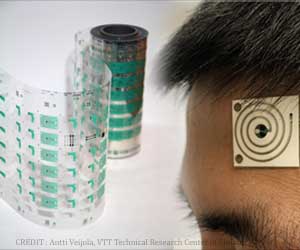The tracking of breathing, heart rate and ammonia is now possible using new, inexpensive sensors built into face masks and t-shirts.
- Wearable sensors that can be integrated into face masks and t-shirts provide non-invasive continuous monitoring of our health and welfare
- The sensors are inexpensive to produce because they are spun from a brand-new cotton-based conductive thread called PECOTEX created by Imperial researchers
“The flexible medium of clothing means our sensors have a wide range of applications. They are also relatively easy to produce. It means we could scale up manufacturing and usher in a new generation of wearables in clothing,” said the first author of the research Fahad Alshabouna, PhD candidate at Imperial’s Department of Bioengineering.
What are the Uses of Wearable Sensors
The study team included the sensors into a face mask to measure respiration, a t-shirt to detect heartbeat, and textiles to track gases like ammonia, which can be used to track liver and kidney function. The ammonia sensors were created to test whether needlework could also be used to make gas sensors.“We demonstrated applications in monitoring cardiac activity and breathing and sensing gases. Future potential applications include diagnosing and monitoring disease and treatment, monitoring the body during exercise, sleep and stress, and use in batteries, heaters and anti-static clothing," said Fahad.
Materials Today features the research.
Continuous Wearable Sensors
Wearable sensors, such as those found on smartwatches, provide non-invasive continuous monitoring of our health and welfare. Currently, wearable sensors smoothly incorporated into garments are not commercially available due to a shortage of suitable conductive threads.The material, created by Imperial researchers and spun into sensors, is machine washable, less breakable and more electrically conductive than commercially available silver-based conductive threads. It allows for the addition of additional layers to produce more intricate sorts of sensors.
Possibilities for Wearable Sensors in Everyday Clothing
Lead author Dr. Firat Guder, also of the Department of Bioengineering, said, “PECOTEX is high-performing, strong and adaptable to different needs. It is readily scalable, meaning we can produce large volumes inexpensively using both domestic and industrial computerized embroidery machines. Our research opens exciting possibilities for wearable sensors in everyday clothing. By monitoring breathing, heart rate and gases they might even be able to help diagnose and monitor disease treatments in the future.”The scientists will then investigate new application fields, including energy storage, energy harvesting and biochemical sensing. They will also identify collaborators for commercialization.
Source-Medindia











